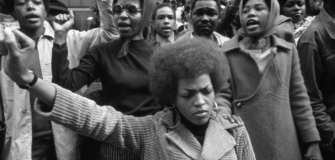Dating After Abuse
Share
Domestic abuse is more common than you might think. Every minute, nearly 20 people experience some form of domestic abuse. It affects Black women disproportionately as we experience rates 50% higher than white women. The reasons are complex and range from systematic oppression to racism and sexism.
…
It came as a surprise to me when I discovered I was one of these women. For three years I was in an abusive relationship and I didn’t even know it. It seemed as though I had to pull strength from the deepest places to make the impossible possible—to leave the love of my life and the father of my child. Though letting go was hard, it was a decision I had to make for my daughter as an important lesson on love. The effects of abuse are traumatic and the road to recovery is bumpy, but I knew I wanted to live a full life and eventually that meant jumping back into the dating pool. Dating after an abusive relationship can be intimidating, but everyone deserves love. While many of us have different journeys it is possible to get your groove back.
Love yourself
We all know how the wise saying goes: “You can’t love anyone until you love yourself.” Conventional wisdom about love and relationships can be more reality than myth. From emotional bruises to physical bruises, I took some blows to my identity that fragmented my self-esteem. I had a responsibility to myself to achieve a healthy state of existence internally. I had to learn to appreciate myself and grow. I had to believe I am worthy of healthy love and kindness.
Get professional help
“Just go to church and pray on it,” they say. The epidemic of mental health struggles in the Black community is ongoing. It was a challenge for me to uproot the stigmas I held against therapy and evolve past the culture that told me mental health troubles were a sign of weakness. For me, therapy was my resolution to honor my healing within. I had a safe space to be seen fully and guide me through my journey to mental balance.
Talk about it
Try to communicate your relationship history to your new partner. For some time I lived in fear and I protected my heart with all my might. However, there was something liberating about being vulnerable despite having experienced domestic abuse. Being able to talk about it was healing for me and laid an honest foundation for new relationships.
Trigger warning
Domestic abuse can show up in the ugliest ways. It can happen anywhere. It can happen anytime. Many domestic abuse survivors are easily triggered. Often, we are set off by past memories of our abusive partner that put us into an emotional spiral. It is important to identify these triggers and communicate them to your partner.
…
After escaping my abusive relationship, I kissed a few frogs. But I am pleased to share with you that I am going on a two year relationship and successfully-ish co-parenting with the father of my child. The course of dating after an abusive relationship is hard and there is no set time when it will stop being so hard, but I want to leave you with this important reminder – if you are reading this, you are not a victim, you are a survivor.
If you or anyone that you know is in need, please call the 24/7 National Domestic Violence Hotline at 1−800−799−7233 or TTY 1−800−787−3224.




Follow Us